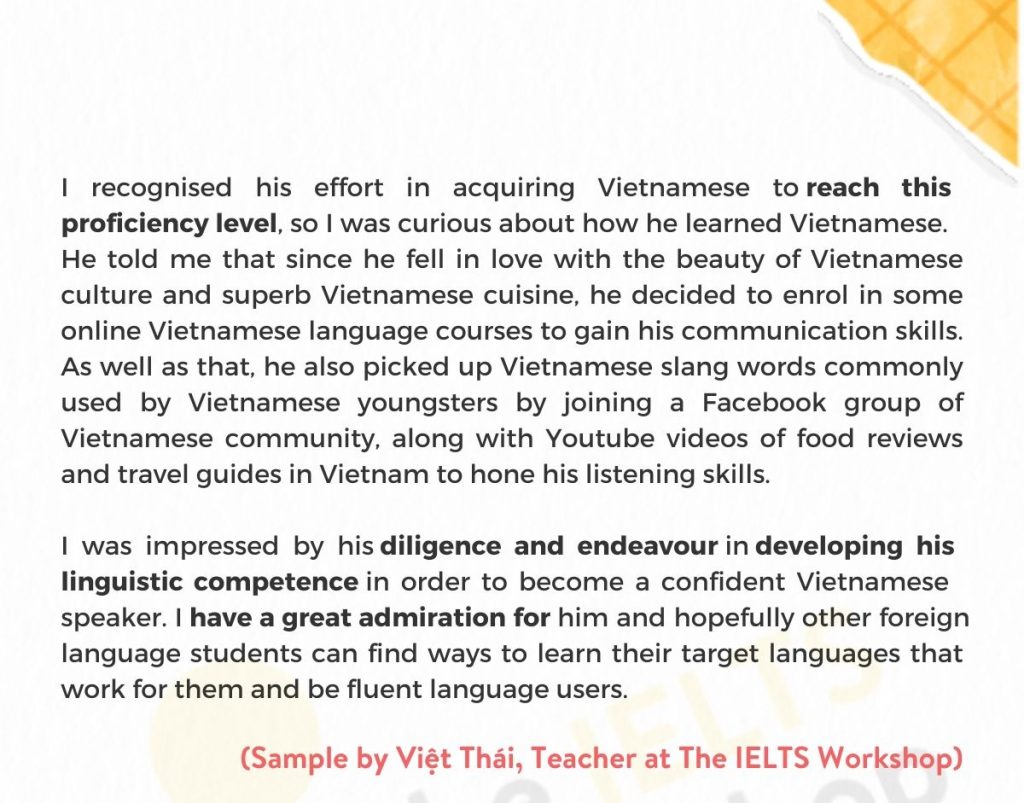Trong chuyên mục giải đề dưới đây, cô Việt Thái của The IELTS Workshop HN sẽ hướng dẫn bạn trả lời topic “Describe a foreigner who speaks Chinese very well“ trong IELTS Speaking Part 2. Cùng tham khảo sample, từ vựng và một vài cách diễn đạt ghi điểm trong phần thi IELTS Speaking nhé.
Part 2: Describe a foreigner who speaks Chinese very well
Describe a foreigner who speaks Chinese very well
You should say:
Who this person is
Where he/she is from
How he/she learns Chinese
And explain why he/she can speak Chinese well
Dưới đây là bài mẫu cho topic “Describe a foreigner who speaks Chinese very well“.
1. Bài mẫu (Sample)


2. Từ vựng (Vocabuary)
- having excellent/extraordinary speaking skills= shows one’s outstanding ability to communicate fluently: có kỹ năng nói xuất sắc/phi thường= thể hiện khả năng giao tiếp trôi chảy vượt trội của một người
- Be struck by st = st leave a striking impression on: Bị ấn tượng bởi st = st để lại ấn tượng sâu sắc trong
- couldn’t hide his excitement: không giấu được sự phấn khích
- demonstrate one’s impressive linguistic ability: thể hiện khả năng ngôn ngữ ấn tượng của một người
- native-like pronunciation: phát âm chuẩn như người bản xứ
- words were fluently uttered by him in an understandable manner: lời nói được anh ấy nói trôi chảy một cách dễ hiểu
- awkward silence: sự im lặng ngượng ngùng
- reach this proficiency level: đạt được mức độ thành thạo này
- diligence and endeavour: sự siêng năng và nỗ lực
- developing one’s linguistic competence: phát triển năng lực ngôn ngữ của một người
- have a great admiration for: có một sự ngưỡng mộ lớn đối với
Part 3
1. What foreign languages do Chinese children learn?
2. Why do Chinese children learn English?
3. Why are so many people learning English?
4. How can you help children learn English?
5. Do you think the way people learn English today is the same as in the past?
6. What are the benefits of the Internet for people’s learning?
1. What foreign languages do Vietnamese children learn?
There are a variety of foreign languages that youngsters in my country have been given the opportunity to acquire since they were kids. It’s prevalent that parents enrol in various language courses for their children, ranging from languages commonly spoken in Asian neighbouring countries such as Japanese, Chinese, Korean or Western countries such as English, French, Italian. Also, I think young people’s choices to pick up certain foreign languages also depends on the amount of exposure they have to certain cultures, especially through movies, music and their virality on social media.
2. Why do Vietnamese children learn English?/Why are so many people learning English?
It’s apparent that English has become an international language, so in this globalisation era, having a good grip on this language can greatly benefit people. Firstly, as English acts as an effective communication tool when travelling abroad, it’s more convenient to deal with any problems you might encounter on your overseas trips, since there’s always someone speaking English out there and giving you instructions on how to tackle certain unexpected issues. Moreover, preparing yourselves to become global citizens can open the door to many opportunities out there, such as pursuing your academic paths or enhancing your employment prospects abroad.
3. How can you help children learn English?
The effective methods to acquire a foreign language like English may vary, depending on different styles of learning. For instance, if you’re a visual learner, improving English vocabulary by using visual aids like pictures or videos might work well for you. If you’re an auditory learner, you might show your preference for listening to other people communicating in your target languages in order to gain the input to produce the language later. However, no matter what type of learner one is, “practice makes perfect” is still what language learners should bear in mind, and only by putting enough effort into frequent practice can you become a competent language user.
4. Do you think the way people learn English today is the same as in the past?
There might exist both similarities and differences between the techniques English learners adopted in their language acquisition process a few decades ago and at the present. In terms of the similarities, I think people would still attempt to improve their communication skills by finding the opportunities to converse with native speakers, or enriching their vocabulary by watching movies of English speaking cultures, or using dictionaries and reading books in English.
Regarding the differences, I reckon that thanks to the explosion of the Internet and social media, as well as the availability of high tech digital gadgets, it has been more convenient for language learners to gain access to the wealth of language knowledge for free, along with expanding their circle of international friends to hone their English skills.
5. What are the benefits of the Internet for people’s language learning?
As I mentioned before, the enormous advantages of the Internet to language learners are undeniable. While distance learning allows learners to study languages at their own pace and in the comfort of their homes, they also have the freedom to access an abundance of learning resources free of charge. For example, it’s possible to make use of various English learning platforms, watching English movies with subtitles, reading online news and blogs in English, to name just a few. Being able to establish friendships with people in other parts of the world by initiating conversations with them in English to exchange information is also one perk of using the Internet to study English.
Từ vựng (Vocabuary)
- prevalent: thịnh hành
- Pick up/acquire + language: Học 1 ngôn ngữ
- virality: tính lan truyền
- have a good grip on this language: nắm vững ngôn ngữ này
- pursue your academic paths: theo đuổi con đường học tập
- enhance employment prospects abroad: nâng cao triển vọng việc làm của bạn ở nước ngoài
- show one’s preference for: thể hiện sự yêu thích hơn của một người đối với
- a competent language user: một người sử dụng ngôn ngữ thành thạo
- enrich one’s vocabulary: làm phong phú vốn từ vựng của một người
- expanding their circle of international friends = establish friendships with people in other parts of the world: mở rộng vòng kết nối bạn bè quốc tế = thiết lập tình bạn với mọi người ở những nơi khác trên thế giới
Bài mẫu bởi cô Việt Thái – Giáo viên The IELTS Workshop HN
Trên đây là bài mẫu cho topic: Describe a foreigner who speaks Chinese very well. Các bạn có thể tham khảo các bài mẫu IELTS Speaking khác của The IELTS Workshop cũng như làm bài test trình độ IELTS tại đây, từ đó đề ra cho mình lộ trình ôn luyện chuẩn xác nhất nhé!
Để có thể học và nắm được phương pháp xây dựng câu trả lời cho phần thi IELTS Speaking Part 3, tham khảo ngay Khóa bổ trợ từng kỹ năng IELTS chuyên sâu của The IELTS Workshop.









